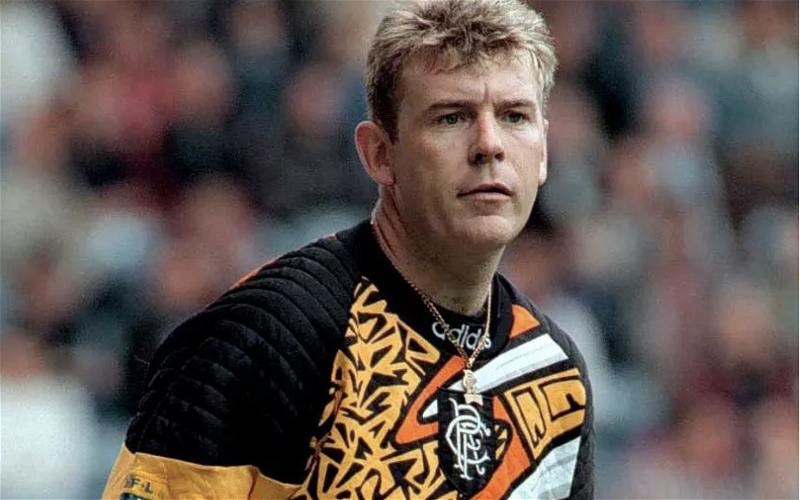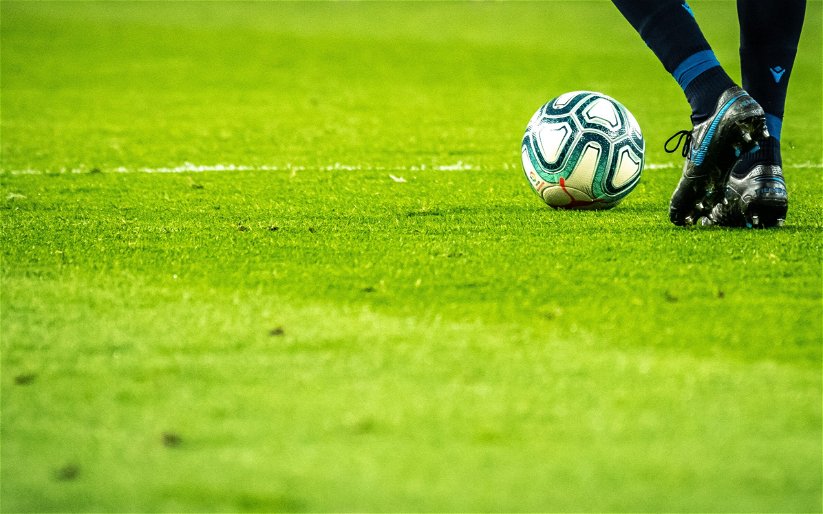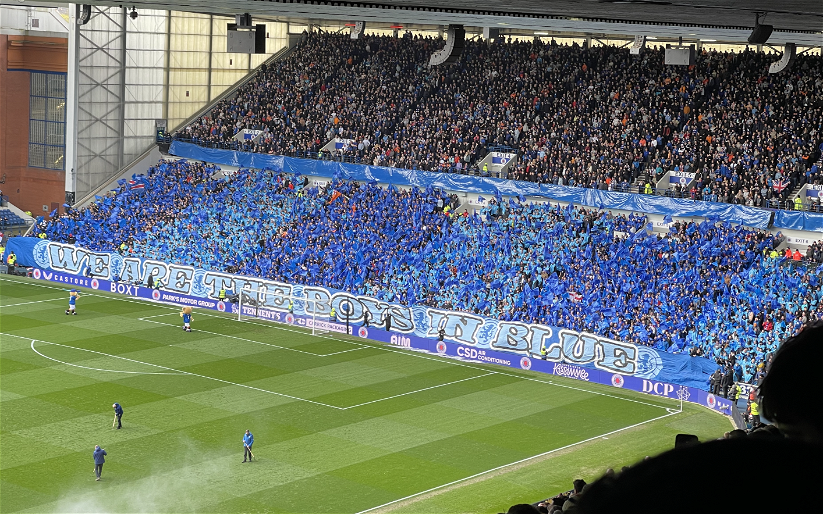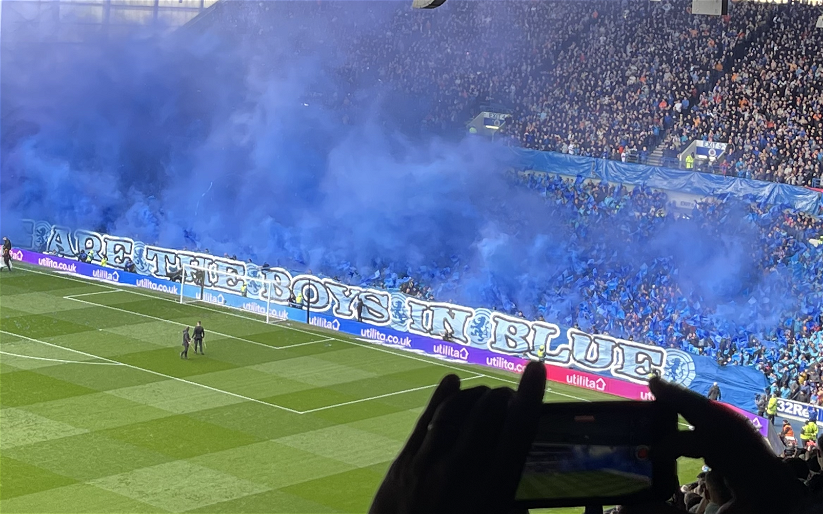By Alistair Aird
A number of players have played for both Rangers and Hibernian over the years. Among them are Harry Rennie, Colin Stein, Iain Munro, Craig Paterson, Gordon Durie, Ray Wilkins, Ian Murray, Kevin Thomson, Kenny Miller, and Russell Latapy. But arguably the name that will come to the fore more often than not is the feature of this Blast from The Past article, the man known simply as ‘The Goalie’.
Andrew Lewis Goram was born on 13 April 1964, and the art of goalkeeping was in his genes.
His father Lewis had also been a shot stopper, starting his career with Leith Athletic. He played for them in a Scottish Cup tie against Rangers at Ibrox in February 1948, and did likewise for Third Lanark in the final league match of season 1949/50. The match ended in a 2-2 draw, giving Rangers the point they needed to pip Hibernian to the title.
In a case of like father, like son, Goram senior also played for Hibernian and was the custodian for Bury, Macclesfield Town, Mossley and Buxton too. And the Goram family were still based south of the border when Goram junior started his football career.
His journey began when he caught the eye of Roy Horobin who was a scout for West Bromwich Albion. He was signed by WBA as an apprentice in 1978, but the move didn’t work out.
Goram spent a year working under the flamboyant Ron Atkinson, but when Atkinson left to join Manchester United, his replacement at the Hawthorns, Ronnie Allen, told young Goram that he had no future as a goalkeeper as he was too small.
But Jimmy Frizzell, the manager of Oldham Athletic, didn’t agree with Allen, and offered 5ft 11in Goram the opportunity to cut his teeth as a professional footballer. He handed Goram his debut in a 1-0 win over Charlton Athletic on 4 May 1982, and the youngster kept his place for the two league games that remained.
Frizzell left Oldham a few weeks later and was replaced by Joe Royle. Initially, the arrival of the former Everton centre forward looked to have put the brakes on the fledgling career of Goram. Royle brought in Martin Hodge on loan from Everton, but when Hodge was struck down by a chest infection early in season 1982/83, 17-year-old Goram was back in.
And he was rarely back out after that. Apart from a stop-start season in 1983/84, Goram was the number one at Boundary Park from that moment until he left to join Hibernian for £325,000 in October 1987. He chalked up 195 league appearances for the Latics and was named in the PFA Team of the Year in season 1986/87.
Goram won the first of 43 Scotland caps against East Germany in October 1985 while with Oldham. Howard Wilkinson had called him up for the England U21s in 1983 – Goram was born in Bury – but he didn’t play in the game. Alex Ferguson, in interim charge of Scotland after the passing of Jock Stein, took advantage of that faux pas and called Goram up due to the fact that his dad had been born in Edinburgh.
Goram was also selected in the squad that travelled to Mexico for the 1986 World Cup, and he took over the gloves at Easter Road from another of the goalies in that pool of players, Alan Rough.
Rough played in the opening 11 league matches of season 1987/88, but after making his debut against Dunfermline Athletic in a 4-0 win at Easter Road on 10 October, Goram didn’t miss a game. He even managed to score a goal on the final day of the season, his long clearance catching out the Morton goalkeeper, David Wylie, in a 3-1 win for the Easter Road side.
Incidentally, that wasn’t Goram’s only goal for Hibernian. In August 1989, Hibernian and Clydebank drew 0-0 in third round of the League Cup. Extra time couldn’t separate the teams so ‘kicks from the penalty mark’ were required. With Hibernian leading 4-3, Clydebank’s Stuart Auld missed. The next kick would therefore be decisive. Goram stepped forward and despatched it.
Goram kept the consistency going in season 1988/89 too. He played in all 36 of Hibernian’s league games, registering six shut outs in the first seven games and 12 in total. He was also played a key role as Hibernian reached the last four of the Scottish Cup and the quarter-finals of the League Cup.
Goram’s run of successive league appearances for the Hibees ended at 84, a failed fitness test counting him out of a 0-0 draw against Dunfermline in December 1989. But his 34 league appearances in season 1989/90 yielded 10 clean sheets, and significantly, three of them came against Rangers.
By the end of season 1990/91, a campaign that would be Goram’s last as a Hibernian player, he had missed only three league games since signing from Oldham. That amounts to 138 league appearances.
And Goram’s ability to repel Rangers was at the forefront during that campaign too, with two clean sheets kept in the four league encounters against his future employers. The latter of those two – a 0-0 draw at Ibrox – featured the long-awaited first-team comeback of Rangers midfielder, Ian Durrant.
Historically in Scotland if you excel against the Old Firm then invariably you end up signing for one half or the other, and that is most certainly the case with Goram. He arrived at Ibrox in the summer of 1991 for a fee of around £1,000,000.
But although he would eventually achieve greatness in the eyes of the Rangers fans, Goram endured a rough and ropey start to his Rangers career. After making his debut in a pre-season friendly against Queen’s Park at Hampden, he kept clean sheets in each of his first two league matches, wins over St Johnstone and Motherwell at Ibrox. However, on the first away trip of the league campaign, Goram was deceived by a looping long-range effort from Scott Crabbe of Hearts.
That goal proved to be the only one of the game, and although Celtic were shut out in the season’s first Old Firm encounter, a few weeks later, the new Rangers goalkeeper was caught out again in the semi-final of the League Cup against Hibernian.
He came off his line to the edge of his penalty area to punch clear a long ball that had been played forward. However, his clearance only went as far as Mickey Weir who chipped the ball over Goram to leave Keith Wright with a simple chance to score.
There would be another high-profile error in the opening round of the European Cup too. Two goals from Stuart McCall had Rangers 2-1 ahead on aggregate, but when Scott Nisbet slid in to cut out a cross, the ball headed towards goal. Goram should have dealt with it, but the ball squirmed through his hands and into the net to give Sparta Prague what proved to be a decisive away goal.
The last of those mistakes would be a watershed moment for Andy Goram. From that moment on, errors from Goram were few and far between as he established himself as one of the key component parts of the successful team that Walter Smith was building. And perhaps his coming of age as a Rangers player came on New Year’s Day 1992 when Rangers visited Parkhead.
A typical predatory finish from Ally McCoist put Rangers ahead, but Tony Mowbray equalised for the home side. A penalty from Mark Hateley squeezed Rangers ahead, but it took a series of wonderful saves from Goram to keep them in front. The pick of the bunch was a diving save to parry away a powerful effort from Paul McStay. A late goal from John Brown sealed the points for the visitors, but the interventions of Goram had been key. It wouldn’t be the last time he would break the hearts of Celtic either.
Goram had enjoyed a superb debut season. Rangers won a fourth successive league title, scoring 101 goals scored and only conceding 31 in the 44 matches played. Goram and his defence had shut the opposition out on 20 occasions. Rangers won the Scottish Cup for the first time since 1981 too.
Goram was the only ever-present in the squad, but at the start of season 1992/93 – a campaign that would prove to be one of the most memorable in the history of Rangers Football Club – he started to suffer from the knee trouble that would dog him for the rest of his playing career.
Goram was exceptional on numerous occasions in season 1992/93, playing every minute in all bar three of the 44 games that Rangers had gone unbeaten since losing in Dundee in August 1992. Among those outstanding displays, three stood out; Leeds United at Elland Road in October 1992, Celtic at Parkhead three days later, and Aberdeen at Pittodrie in March 1993. He was beaten just once in those three games – a late consolation goal for Leeds that clearly irked him – and his breathtaking performance at Pittordrie arguably sealed what would be the fifth of the nine-in-a-row titles.
Rangers travelled to the Granite City on a cold Tuesday evening in February. Walter Smith’s side were in the midst of a long unbeaten run – their last defeat had been at Dens Park back in August – but that record was in jeopardy throughout the 90 minutes against an Aberdeen side that hadn’t been defeated since losing to Rangers in the League Cup Final in October.
Mixu Paatelainen was the first to test Goram with a curling shot from long range, and Goram denied the Finnish striker again, sprawling across his goal to parry away a powerful header that was destined for the bottom corner.
Scott Booth was the next Don to be thwarted, and Eoin Jess had his head in hands when Goram batted away his right foot volley. This was all before the half time interval too!
Rangers had offered little in attack – they won their first corner kick nine minutes after half time – yet they took the lead just a minute shy of the hour mark. Mark Hateley, no stranger to a vital goal against Aberdeen, rose imperiously to meet a Gary Stevens cross and direct a header beyond Theo Snelders.
To sum up how much against the run of play that was, match commentator, Jock Brown, said, ‘The Rangers supporters I’m sure can scarcely believe that. In the context of a game in which Rangers have had a mauling, they’ve taken the lead.’
But that slender lead still had to be protected, and the man who ensured it would be was Andy Goram, even if a stroke of luck was involved.
Aberdeen won a free kick deep into stoppage time when the ball struck the hand of Dale Gordon. The initial effort from Jess struck the wall, but his effort on the rebound slipped through the hands and legs of Goram. Mercifully the ball didn’t find the net, Goram recovering to clutch the ball into his chest. ‘It’s a good job my backside is big,’ retorted the Rangers goalkeeper when reflecting on the incident in the club’s season-ending video compilation.
Goram’s performances were recognised by his fellow professionals and the Scottish Football Writers Association at the end of the season. Goram picked up Player of the Year awards for both the SPFA and the SFWA, but knee ligament surgery in the summer of 1993 would rule him out of action for a number of months.
He returned to action late in January 1994, playing three times for the reserves, but it would be 12 February 1994 before he appeared for the first team. He kept a clean sheet in a 2-0 win over Hibernian, but Goram’s season was ended abruptly a couple of months later.
After a run of nine appearances, Goram picked up a thigh injury in a 0-0 draw against Dundee United. He then tore a muscle in his back in the Ibrox gym. And pretty soon, it looked like that match at Tannadice may well be the last time Goram would play for Rangers.
Incensed by Goram’s fitness levels and attitude, Walter Smith placed his number one goalkeeper on the transfer list in the summer of 1994. After that sublime season in 1992/93 where Goram cemented his status as one of the best goalkeepers in the world, he had been bedevilled by injury and the end appeared to be nigh at Rangers. But after the gauntlet was thrown down by Smith, Goram responded. He reported for training trim and ready to go and was promptly taken off the transfer list.
Goram was back to his brilliant best in the early weeks of season 1994/95. Although Rangers were beaten 2-0 in Greece against AEK Athens in the first leg of a qualifying match for the Champions League, Goram made a number of outstanding saves to keep the scoreline respectable.
He would play in each of the opening 17 league games too, keeping seven clean sheets. But a calf injury called a halt to that run of games, and when his comeback match against Partick Thistle at Firhill in January 1995 was aborted after just 29 minutes by another injury to the same calf, Goram’s season was effectively over. He went under the knife to solve the problem and didn’t play again for the first team until he came on as a substitute in the final game of the season against, ironically, Partick Thistle.
Season 1995/96 would witness the arrival of Paul Gascoigne and also see Goram bouncing back from injury. He enjoyed his most consistent run of games for a number of years, playing in 47 of the 53 competitive matches Rangers played. He excelled at all levels, but it was in the games against Celtic that he really came to the fore.
With Tommy Burns in charge, Celtic were hoping to outgun Rangers and win the Premier Division championship and in so doing, halt the juggernaut that was hurtling towards an eighth title in a row. Celtic had done nine-in-a-row between 1966 and 1974, but a relentless Rangers were on course to match that. The Celtic supporters were imploring them to stop that from happening, but they hadn’t accounted for the brilliance of Andy Goram.
Rangers faced their Old Firm rivals on six occasions that season and posted a record of three wins and three draws. Only five goals were conceded, with three of them coming in an epic 3-3 draw at Ibrox in November. Goram kept three clean sheets and made countless saves to deny Burns and his team and break their hearts. But it is a save in that six-goal thriller at Ibrox that stood out more than most.
The match had ebbed and flowed, Celtic taking the lead through Andreas Thom before Rangers thought they had equalised through David Robertson. The full-back’s goal was ruled out – TV pictures would reveal that it should have stood as he was onside – but Brian Laudrup did eventually restore parity before half-time. A John Collins penalty six minutes after the restart edged the visitors ahead again before Ally McCoist did what Ally McCoist did on a regular basis, rescued Rangers with a vital goal.
But just three minutes after McCoist’s header had nestled in the net, Goram ensured that the game remained level. Jackie McNamara crossed from the right, and Pierre van Hooijdonk met the ball on the volley from no more than six yards range. A goal seemed certain until Goram raised his right arm and diverted the ball wide for a corner. It was an astonishing save, but for Goram that kind of thing was becoming the norm rather than the expectation.
Season 1995/96 ended with two virtuoso performances. Paul Gascoigne scored a stunning hat-trick in the penultimate league game against Aberdeen to seal eight-in-a-row, and 20 days later, Brian Laudrup broke Hearts with a devastating display that produced two goals and three assists in the Scottish Cup Final.
Goram had thus added another two medals to his collection, but sights were now set firmly on gaining arguably the most important one of them all, a record-equalling ninth successive league title for Rangers.
‘The Goalie’ started the first eight league matches before injury counted him out for three league games, a League Cup semi-final, and a Champions League double header against Ajax that featured a red card for the maverick Gascoigne.
But Goram was back between the posts when Rangers travelled to Parkhead to face Celtic in November. And it would be yet another occasion when he would shatter the opposition’s heart.
Rangers took the lead after seven minutes thanks to a long-range effort from Brian Laudrup, and when the Great Dane was fouled in the box after 69 minutes, an opportunity presented itself to double the lead. Alas, Gascoigne spurned it when his tame penalty was saved by Stewart Kerr.
Another gilt-edged chance was passed up with seven minutes remaining when Peter van Vossen somehow managed to spoon the ball over a gaping goal. And Rangers would have been left to rue those missed opportunities were it not for Andy Goram.
Celtic were pressing for an equaliser when Richard Gough took out Simon Donnelly inside the penalty area. Even the most ardent Rangers fan had to admit it was a penalty kick. Cue Martin Tyler in commentary:
‘Pierre van Hooijdonk to keep his nerve, and keep Celtic top of the table’
The Dutchman didn’t keep his side top of the table. He struck the ball with his right foot, but Goram plunged to his right to parry the ball to safety. Gough later admitted that he had advised his goalkeeper to dive to his left!
Goram would play in all but one of the next 17 league games, a virus counting him out of a 2-1 win at Easter Road in January. Rangers dropped just three points in that run, losing 1-0 at Tannadice in December, and the victory over Hibernian came two days after a couple of Erik Bo Andersen goals and a thumping free-kick from Jorg Albertz had chalked up three wins out of three against Celtic in the league. That meant it was now nine Old Firm games undefeated for Rangers, but 10-in-a-row would prove elusive.
Drawn against Celtic in the last eight of the Scottish Cup, Smith’s men chose this match to turn in their worst performance of the season. Goram was beaten inside the opening 20 minutes by Malky Mackay and a Paolo di Canio penalty, and Rangers offered little in response. The Treble dream had been shattered.
It later transpired that Goram had cracked his ribs in training, but a pain-killing injection helped him pass a fitness test 75 minutes ahead of kick-off. He took another injection to face Dundee United in the league, but he twisted his knee in the 1-0 defeat which ruled him out of the league showdown against Celtic in Glasgow’s East End.
What would be Andy Goram’s final season as a Rangers player, 1997/98, was once again blighted by injury. He played in 25 of the 36 league games as the bid for 10-in-a-row eventually foundered, and like so many others, Goram made his last Rangers appearance in the 2-1 defeat against Hearts in the Scottish Cup Final.
It wasn’t the way the career of arguably the greatest ever Ranges goalkeeper should have ended. Since signing for the club, Goram had won six league titles, three Scottish Cups and two League Cups. Looking at League, Scottish Cup, Scottish League Cup, and European matches, he conceded an average of a goal every 1.817 games and his shut-out record stands at 108. Taking into account friendly matches and testimonials, Goram totalled 282 appearances in a Rangers jersey.
His Old Firm record is impressive too. Goram faced Celtic 26 times in a Rangers jersey. Fifteen of the matches were won and he tasted defeat on only five occasions, recording 11 shut outs and conceding 22 goals.
Departing on a free transfer in the summer of 1998, Goram played one league game for Notts County before he joined Sheffield United. He was brought in to provide cover for Alan Kelly and Simon Tracey and made a total of nine appearances for the Blades.
A return to Scotland was on the horizon, though, and Andy signed for Motherwell in January 1999. A series of impressive displays followed, and he was appointed captain by manager Billy Davies. After making 69 appearances for Motherwell, Goram left in March 2001. His destination? Old Trafford!
Goram, who penned a deal to the end of the season, made two appearances for United. His debut was a 4-2 win over Coventry City at Old Trafford. He was substituted by van der Gouw after 66 minutes and the same thing happened in his only other Red Devils match, a 2-1 defeat against Southampton at The Dell.
The Goalie returned to Motherwell in the summer of 2001. But his contract was not extended at Fir Park, and after making guest appearances for Blackpool and Boreham Wood and playing a trial match for Hamilton Accies, Goram had a short spell with Coventry City.
At the age of 38, Goram’s next move took him to Queen of the South where he balanced playing with his coaching commitments with Motherwell. In his single season at Palmerston Park, Goram was part of the Doonhamers side that won the Scottish Challenge Cup in October 2002, and he ended his career after short spells with Oldham and Elgin City.
After hanging up his gloves, Goram took on the role of goalkeeping coach at numerous clubs, including Clyde, Hamilton Accies, Ayr United and Cambuslang Rangers.
Sadly, Goram is no longer with us. It was announced on 30 May 2022 that he had terminal cancer. He passed away at the age of 58 on 2 July 2022.
The ‘greatest-ever’ debates that take place among football supporters of any club are always subjective. But when conversations start on who deserves the accolade of Rangers Football Club’s greatest-ever goalkeeper, the name of Andrew Lewis Goram is most definitely at the top end of the list.




